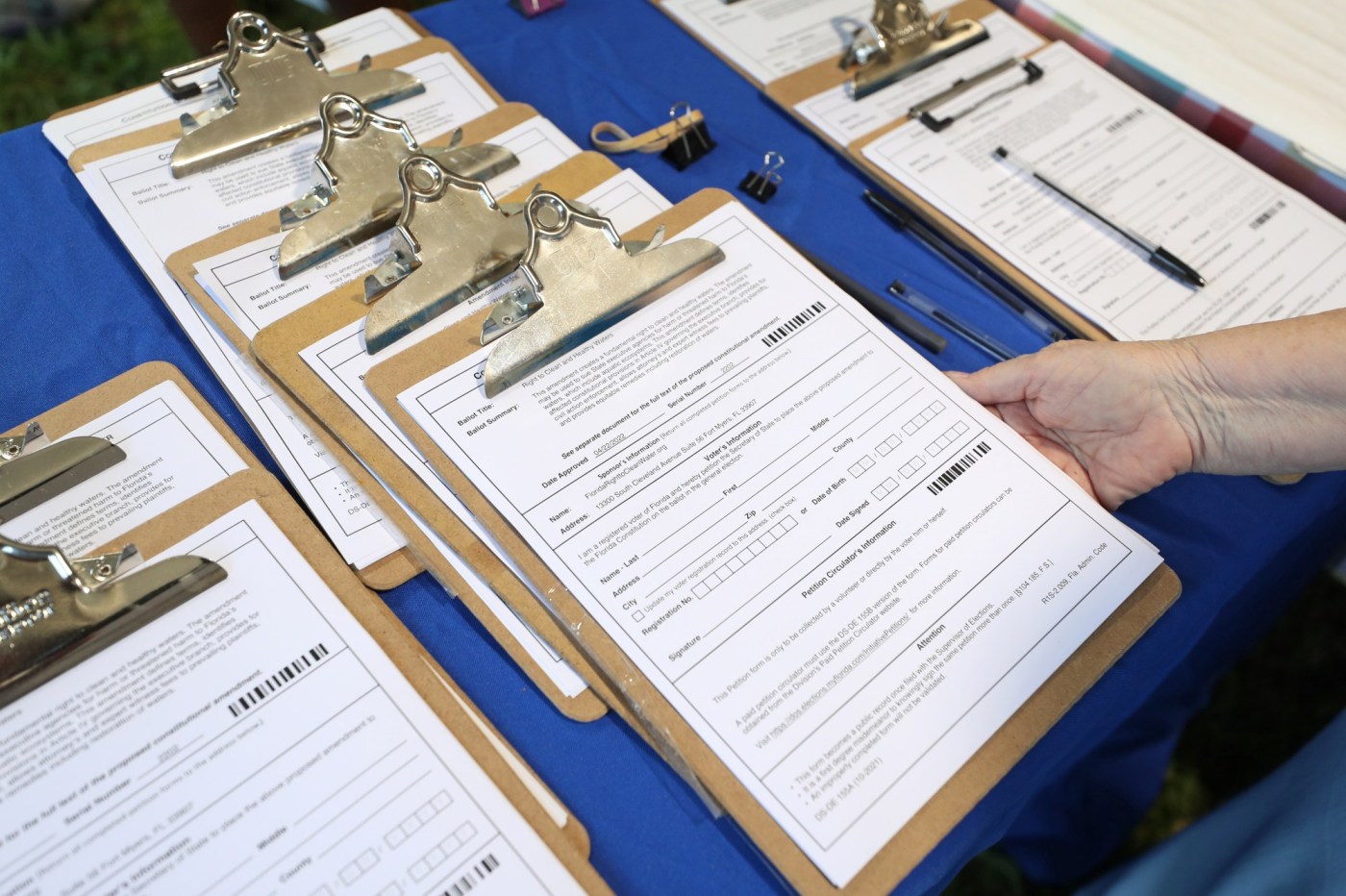A sharply divided panel of the 11th U.S. Circuit Court of Appeals has temporarily suspended a lower court’s ruling that blocked sections of a new Florida law restricting signature collection for ballot proposals. The law, which prohibits non-Florida residents and non-U.S. citizens from gathering signatures, was enacted following the narrow failure of proposed constitutional amendments on recreational marijuana and abortion rights in November 2022.
Governor Ron DeSantis and Republican legislators introduced these restrictions in a sweeping election law passed earlier this year. The political committee Florida Decides Healthcare, which is advocating for a ballot measure to expand Medicaid coverage, filed a federal lawsuit in May. The lawsuit contends that the restrictions infringe on constitutionally protected political speech. Another plaintiff in the case, Smart & Safe Florida, is promoting a recreational marijuana initiative.
In July, U.S. District Judge Mark Walker issued a preliminary injunction against the law, asserting that it unnecessarily limited the activities of political committees. On Tuesday, however, a 2-1 decision from the appeals court sided with DeSantis’ administration, stating that the state had presented a compelling case that the law, known as HB 1205, does not violate the First Amendment.
The court’s opinion, written by Judge Barbara Lagoa and joined by Judge Elizabeth Branch, indicated that the law does not impede any speech aspects of the petition-circulation process. Lagoa argued that the law merely limits who can collect signed petitions but does not prevent non-citizens or non-residents from distributing blank forms or engaging with voters about ballot measures. “Nothing in HB 1205 limits a nonresident or noncitizen from speaking to and attempting to persuade a Florida voter on any political issue whatsoever,” Lagoa asserted.
Under the new law, groups that “knowingly” violate the restrictions could face fines of up to $50,000 and other penalties. Petitions collected by individuals not meeting the residency or citizenship requirements would need to be discarded.
Attorney General James Uthmeier praised the appeals court’s decision, asserting that individuals from outside Florida should not have the authority to collect petitions from Floridians wishing to amend the state constitution. “The 11th Circuit Court of Appeals agreed and put a stop to a district court that tried to legislate from the bench. Big win for our Constitution!” Uthmeier stated in a post on X.
Judge Nancy Abudu dissented, criticizing the majority opinion for straying from established court precedents. She expressed concern that the ruling could portray the appeals court as an outlier and potentially invite a review from the U.S. Supreme Court. Abudu argued that the law imposes a significant barrier to political participation and violates First Amendment principles. She emphasized that Walker’s findings concerning the law’s impact deserved respect and consideration.
The dissent raised alarm over the broader implications of the ruling, suggesting that if the law is upheld, Florida could potentially criminalize various forms of expressive activities under the guise of regulating conduct rather than speech. “This is a drastic departure from First Amendment case law,” Abudu wrote, emphasizing the foundational principles of free expression.
The majority opinion countered Abudu’s dissent by stating that the law does not interfere with the political discourse surrounding petition circulation, as efforts to persuade voters typically occur before they decide to sign a petition.
The DeSantis administration has argued that the restrictions are necessary to address challenges in investigating potential fraud related to ballot initiatives. The state cited a report from the Office of Elections Crimes and Security that identified instances of misconduct associated with the 2024 ballot initiatives.
In response to the ruling, supporters of the Medicaid ballot initiative expressed disappointment but remained hopeful that the law would ultimately be deemed unconstitutional. Mitch Emerson, executive director of Florida Decides Healthcare, stated that the court overlooked significant First Amendment concerns by upholding the law, which effectively bans entire categories of people from participating in crucial political activities.
Groups opposing the law have indicated that the restrictions will severely limit their ability to gather the required 880,000 valid signatures by the deadline of February 1, 2026, for placement on the ballot. For instance, Smart & Safe Florida has had to terminate hundreds of out-of-state workers as it works to revise its recreational marijuana proposal.
The case has highlighted a stark divide among judges appointed to the conservative-leaning 11th Circuit, with Lagoa and Branch having been appointed by former President Donald Trump, while Abudu was appointed by former President Joe Biden. Abudu’s dissent criticized the majority decision for claiming that Walker “abused (his) discretion” in issuing the preliminary injunction, emphasizing the deference typically afforded to lower court judges.
As the legal battle continues, the implications of this ruling could shape the future landscape of political engagement in Florida, raising important questions about the intersection of election law and constitutional rights.
